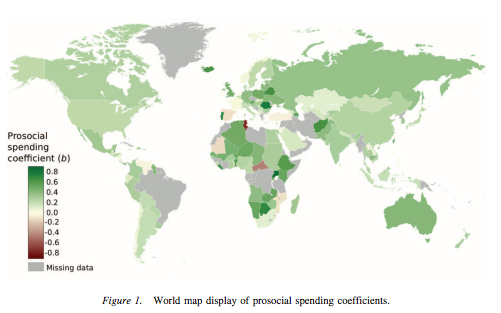An article of interest in the latest issue of Psychological Science:
Subjective Status Shapes Political Preferences, by Jazmin L. Brown-Iannuzzi, Kristjen B. Lundberg, Aaron C. Kay B. Keith Payne (November, 2014).
Introduction
Economic inequality is at historically high levels and rising. The United States has the highest level of inequality of all industrialized countries, with the wealthiest 1% of Americans owning nearly 50% of the country’s wealth (Keister & Moller, 2000; Wolff, 2002). Greater economic inequality within a society is associated with a variety of problems, including lower subjective well-being, shorter life expectancy, and increased crime (Wilkinson & Pickett, 2009). Moreover, surveys show that a large majority of Americans would prefer a more equal distribution of wealth (Norton & Ariely, 2011). Curiously, though, the majority of Americans also tends to support tax cuts and reduced spending on social services aimed at reducing inequality (Bartels, 2005). What drives the public’s complex attitudes toward the distribution of wealth?
Two frequently cited factors are economic ideologies and economic self-interest. The ideology explanation assumes that attitudes toward redistribution are driven by a coherent system of principles governing how resources should be distributed. Individualist ideologies view an individual’s hard work and talent as the primary causes of economic outcomes, and generally oppose redistributive policies. Egalitarian ideologies assume that fairness entails treating everyone equally, and are generally supportive of redistribution. Although certain ideologies are consistently associated with attitudes toward redistribution, the evidence is almost exclusively correlational, leaving open the question of causal direction. We acknowledge that ideologies can cause people to support or oppose redistributive policies, but we suggest that the causal arrow can sometimes point in the other direction as well. That is, we suggest that the correlation between ideology and attitudes toward redistribution may in part reflect ideological justifications for policy preferences.
Consistent with this position is the fact that meritocracy and egalitarianism frequently coexist within the same culture and even within the same person. Kay and Eibach (2012) argued that people generally hold multiple, often contradictory, ideologies that become more or less accessible as a function of chronic and situational factors (Higgins, 1996). Growing evidence suggests that political ideology can be a reaction to psychological motivations (Jost, Glaser, Kruglanski, & Sulloway, 2003; Kay, Gaucher, Napier, Callan, & Laurin, 2008). Like beliefs of all kinds, ideologies are sometimes adopted because they satisfy particular needs. Even when motivational factors are at work, people tend to experience ideologies as principled beliefs about fairness and justice, rather than as arising from circumstance and self-interest (Ross & Ward, 1996).
Thus, we argue that policy preferences and the ideologies that legitimize them may also fluctuate on the basis of momentary motivations and self-serving preferences. Self-serving preferences, however, are not as straightforward as they seem. According to the self-interest explanation of attitudes toward redistribution, redistributive policies that take resources from the wealthy to provide benefits to the poor should be favored by the poor but opposed by the wealthy. Although some evidence supports this intuitive idea, the association between income and opposition to redistribution is small (Finseraas, 2009; Gilens, 2000; Kluegel & Smith, 1986). This may be, in part, because many citizens do not know what policies are in their self-interest. In one study, most Americans could not accurately identify whether the tax cuts of the George W. Bush administration would benefit them (Bartels, 2005), and about half of the beneficiaries of federal programs believe that they have never benefited from a government program (Mettler, 2010). Such inaccuracies suggest that subjective perceptions of status may be important in shaping attitudes toward redistribution and the ideologies they reflect.
Abstract
. . . . We hypothesized that participants would support redistribution more when they felt low than when they felt high in subjective status, even when actual resources and self-interest were held constant. Moreover, we predicted that people would legitimize these shifts in policy attitudes by appealing selectively to ideological principles concerning fairness. In four studies, we found correlational (Study 1) and experimental (Studies 2–4) evidence that subjective status motivates shifts in support for redistributive policies along with the ideological principles that justify them.




































